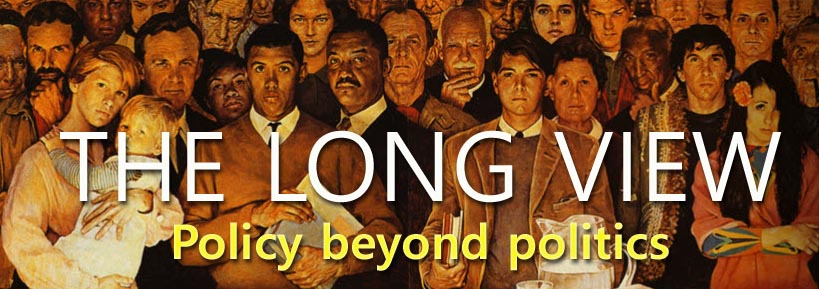“I have already intimated to you the danger of parties in the State, with particular reference to the founding of them on geographical discrimination. Let me now take a more comprehensive view, and warn you in the most solemn manner against the baneful effects of the spirit of party generally.
This spirit, unfortunately, is inseparable from our nature, having its root in the strongest passions of the human mind. It exists under different shapes in all governments, more or less stifled, controlled, or repressed; but, in those of the popular form, it is seen in its greatest rankness, and is truly their worst enemy."
Looking at the partisan gridlock that shuts down the Federal Government every other year should reminds us George Washington's warning in his 1796 Farewell Address. In this last speech, Washington -who had decided to be a two-term president and retire from public life at the height of his popularity instead of becoming (as some proposed) a King- lay down critical advice for those he knew will follow in a peaceful succession of governments.
What Washington described more than 200 years ago is on today's news -and every four or some years-:
"The alternate domination of one faction over another, sharpened by the spirit of revenge, natural to party dissension, which in different ages and countries has perpetrated the most horrid enormities, is itself a frightful despotism. "Partisanship, Washington warned:
"serves always to distract the public councils and enfeeble the public administration. It agitates the community with ill-founded jealousies and false alarms, kindles the animosity of one part against another, foments occasionally riot and insurrection. It opens the door to foreign influence and corruption, which finds a facilitated access to the government itself through the channels of party passions. Thus the policy and the will of one country are subjected to the policy and will of another."
Government shutdowns and filibusters are some of the forms divided government protects us from our extremists and our partisan excesses. Far from being "dysfunctional" (as frustrated partisans claim every time they play the play) is extremely effective as a enforcer of reason and negotiation. Everybody is served its share of humble pie and reminded government in the US is divided on purpose. And the purpose is bargaining and compromising.
Washington understood the value of partisan cross-checks over administrations as a way to keep them from excesses such as those the Framers saw in France with the Terror days. Partisanship was a natural manifestation of liberty to be protected:
"There is an opinion that parties in free countries are useful checks upon the administration of the government and serve to keep alive the spirit of liberty. This within certain limits is probably true; and in governments of a monarchical cast, patriotism may look with indulgence, if not with favor, upon the spirit of party.But with restraint:
"in governments purely elective, it is a spirit not to be encouraged. From their natural tendency, it is certain there will always be enough of that spirit for every salutary purpose. And there being constant danger of excess, the effort ought to be by force of public opinion, to mitigate and assuage it. A fire not to be quenched, it demands a uniform vigilance to prevent its bursting into a flame, lest, instead of warming, it should consume.”"
Looking at gridlock with the lenses of a long view, one of those restraints to extremism is the division of powers and the ability of each branch to put a stop on the others.
Madison (Federalist 10) and the Framers designed what we could call "the Madison trap" in the Constitution, creating a Republic of law ruled through layers of powers and representatives instead of a popular (and populist) Democracy ruled by referendums and "mandates" from circumstantial majorities. United States were not designed to elect monarchs but temporary custodians of the public interest.
A divided government, paradoxically, helped a "house divided" such as the United States are stand together better than a monolithic one.
After 250 + years, no other democratic government on Earth has succeeded without a single year of dictatorship. No Cesar, no Napoleon, no Party. Not even during or after a Civil War. Lincoln took war powers with restraint, looking at the long view of the war's aftermath and reconciliation.
For all the irrationality, waste and foolishness of the rules that allow government shutdowns, filibusters, federal and state rights and courts or other ways to block circumstantial majorities from ramming their priorities through our COTUS -or one-sided SCOTUS from legislating from the bench- , these "dysfunctional" rules of governance have been and will continue to be essential in keeping the United States as a Republic, just as Benjamin Franklin wanted.
Trump and Pelosi, as those who preceded them and those who will follow, will have to accept a negotiate with each other. The cost and difficulty of gridlock will always be lesser than the alternative. Look at Venezuela.
That's worth the regular scandal and food-fight spectacle we have every other time a controversial decision is to be made.
A house divided is, paradoxically, the way for US to stand.
That's worth the regular scandal and food-fight spectacle we have every other time a controversial decision is to be made.
A house divided is, paradoxically, the way for US to stand.







